
How equally unsurprising: listening to the fund managers bleat about it.
“You’ll ruin your own retirement if you take your super now,” they’ve warned, wagging a finger. “You won’t be able to live in comfort in your old age.”
No question, some people who have applied for early release of super need the money (up to $10,000 this financial year, and up to $10,000 next financial year, provided you can show a loss of income) – they are on their knees.
No question, some don’t really “need” the money but took it anyway.
Because it’s theirs. And they can think of, shall we say, an astonishing 10 billion ways to spend it.
Some have renovated the bathroom. Some have paved the back courtyard. How do we know? Because business related to home renovation, building and hardware have been booming during COVID-19.
You can, of course, define “need” anyway you like, but Gerard Cockburn’s report today
suggests that plenty of the people who lined up at Bunnings last week to spend a little of their “early release” remain in good jobs but have found a “need” to access their super.
The default superannuation fund for federal public servants and military personnel, for example, “has paid out more than $100m under the early release of super scheme.”
That sound you hear is the wailing of the fund managers, but I think we can afford to ignore them.
They say they don’t want you to take your super because they’re worried about you in your old age.
Are they really though?
Managing one of these funds must be the easiest job on earth. Truly, it’s astounding how poorly some of them do.
Every working Australian must, by law, hand a percentage of their income over to the super.
Imagine that: a guaranteed income stream for these funds, forever, and it only ever increases, because there’s always more of us, and the national pool of income continues to increase, even if the average punter never seems to get a pay rise.
These contributions must then be invested, and since it’s a never-ending flow into the same stocks and bonds, that’s a pretty easy job, too.
Of course, the fund managers still justify a way to pay themselves quite extraordinary commissions, salaries and bonuses.
The top guys are earning millions of dollars a year, for collecting cash from punters who have no option other than to give it to them.
In return, the funds deliver a pittance, with the annual return on most of them rarely getting as high as six per cent.
The idea is for you to have a nest egg when you can’t work anymore, meaning all you can do is hope you don’t die before you get a chance to spend some of it.
And now there’s talk of taxing it on your death, so you won’t even be able to pass it on.
Cockburn’s report says $10.6bn has been paid out to 1.59 million applicants during the past six weeks.
The bulk of the money has gone to workers in retail, hospitality and tourism.
So, some of the applicants are genuinely in strife. They worked as wedding caterers, or in gyms, or as Uber drivers, and their businesses were put into a coma (and are now reviving.)
But plenty of other people simply decided to take their super while they could, and they are now doing their bit for the nation, stimulating the economy with their little windfall, having decided they “need” to spend “their money” right now.
Not everyone keeps a close eye on the super rules, but it’s worth noting that the contribution you have to make, compulsorily, will go up from 9.5 per cent to 10 per cent, in July next year.
It’s on its way to 12 per cent by 2025.
My colleague Adam Creighton says that’s $23bn a year in extra contributions – and that’s equal to an astounding $230m in extra fees, on top of the $35bn – yes I said billion – in fees that already flows into financial services every year.
That, too, is money they’ll be taking from you, for doing not very much. So, we’re truly surprised to see punters taking a measly $10K back, while the option’s open to them? We shouldn’t be.
Will the nation now be plunged into crisis, with millions of the elderly soon to be in the soup queue? That’s what the well-shod fund managers saying will happen.
Or do you think that most of those who didn’t strictly “need” but “wanted” are responsible enough to know how much they could afford to take to feather the nest in which they live right now, and still enjoy their retirement?






How utterly unsurprising: punters have rushed during the COVID-19 pandemic to snatch their money back from superannuation funds.